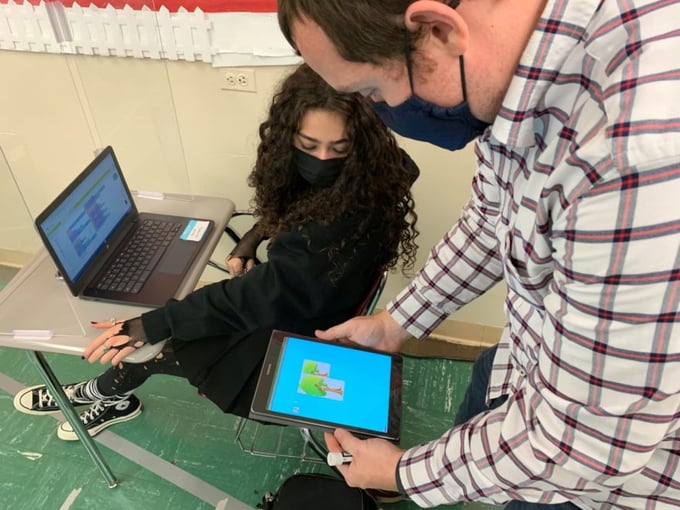Adam Anderson teaches PLTW Computer Science at Hoboken High School in Hoboken, New Jersey. He began teaching PLTW courses this year, but has used project-based or task-driven teaching techniques for three years.
You are teaching a PLTW class. Great! Now what?
As a new teacher of PLTW, you will have many questions as you complete your training and start your first days of instruction. How do I run a project-based class? What if the students are off task?
These were the two major questions I had when starting. I've done the research. I know what works best. But putting that into practice is a different concern.
I'll give you a hint – release some control. You will have days where no one understands anything, and that's ok. You will have days where the project takes half the time you expected, and that's ok. As a project-based curriculum, the power lies not with the teacher. It lies with the students. Embrace it. Enjoy it. Thrive within it. Your students are your guide. You are a cheerleader; there to provide support and guidance only when absolutely necessary. Your job is to encourage them and increase their self-esteem, not to complete the project for them.
This is a massive change and undertaking for you. I know; I was there. Relinquish some of your power in the classroom and let the students control their knowledge. This will be a new experience for them as well.
I am currently teaching Computer Science Essentials. After getting through Section 1, I've come to realize this is fun. We just finished Project 1.1.6, where students are permitted to design their own code and play around. I asked my students what they would tell a new PLTW student, and here are some of their responses:
"I would say that to any upcoming PLTW students, to keep trying no matter what and don't give up. Always stick with your gut, and it's okay to make mistakes."
"A piece of advice would be to always read something twice. if you´re following a procedure, read carefully or you´ll miss an important part of the procedure."
"To new PLTW students, I would tell them to work hard and put effort into what you are doing. Try your hardest and brainstorm ideas before starting your project."
"During these unexpected experiences that I had that I'm actually having fun aside from the frustrating parts. Take your time with learning, they are not always going to give you the answers just think and read around what they asked you to do."
Just as it is for you, it's a new experience for the students as well. Not having the teacher as a focal point of the classroom and transferring the knowledge will confuse them. Use this opportunity to build a classroom environment where it is ok to be wrong; it's ok to fail, as long as there is hard work that follows.
Treat your first time teaching a PLTW course as a learning experience for all. You will come to embrace chaos and learning. Work on your craft of being annoying. Respond to questions with questions. Probe their brain instead of giving the answer. Lead them, not give it to them. All of these things are new to us. Learn just as they learn – by getting your hands dirty and trying new things. Have fun!
PLTW’s blog intends to serve as a forum for ideas and perspectives from across our network. The opinions expressed are those of each guest author.


